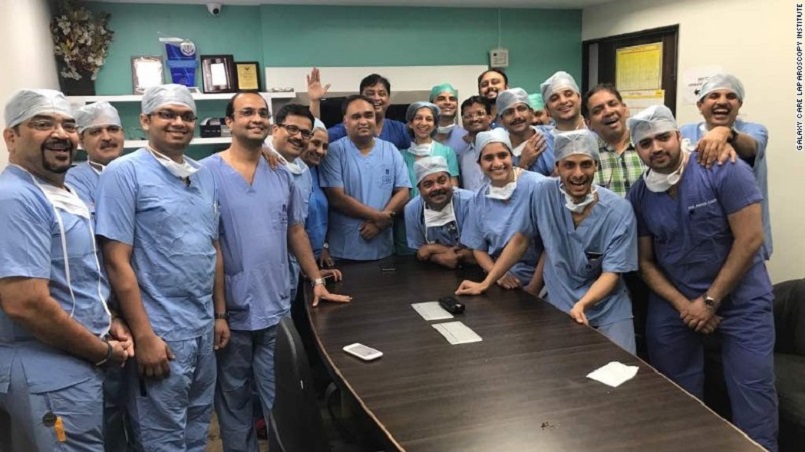
In the first surgery of its kind in India, a mother has donated her uterus to her 21-year-old daughter.
The 43-year-old offered to undergo the procedure so that her daughter, who was born without a uterus, can experience childbirth.
The uterus, or womb, transplant took place in the city of Pune in southwest India, Thursday.
The surgery was performed by a team of doctors at Pune's Galaxy Care Hospital and led by the hospital's medical director, Dr. Shailesh Puntambekar.
"The patients are fine. The surgery took nine and a half hours in total," he said.
"The procedure is difficult because multiple large arteries are to be joined there, and veins that are small and short," said Puntambekar. "It is technically very tough."
The patient will have to wait a year before trying to become pregnant through in-vitro fertilization (IVF), giving her body enough time to heal and adjust to the new uterus.
According to Dr. Mats Brännström, a professor of obstetrics and gynaecology at Sweden's University of Gothenburg, only six babies have ever been delivered from a uterus transplant -- two from the same mother.
Brännström led the team that first successfully performed the procedure in 2014, when -- after 11 unsuccessful attempts worldwide by their team and others -- a healthy baby was born in Sweden.
All five babies delivered since have been the result of surgeries performed by the Swedish team.
Doubts about childbirth
It remains to be seen whether India's first transplant will result in a birth.
"We are responsible for the patient and fulfilling their dreams of becoming a mother, which was impossible for them until now," Puntambekar said, adding that he was aware of the "responsibility on his shoulders," but was feeling "relaxed and confident."
Successful uterus transplants are rare because of the complexity of the procedure involved: this was the first attempt at the pioneering surgery in India and only the 30th attempt in the world.
Attempts have also taken place in the United States, Brazil, Sweden, China, Germany, Serbia, Czech Republic, Saudi Arabia and Turkey, said Brännström.
New way to conceive
In a condition known as absolute uterine infertility, an absent, removed or diseased uterus can render a woman infertile. It affects one in 500 women of fertile age, or about 1.5 million women globally.
Uterus transplants could be a way for women with absolute uterine infertility to conceive, rather than having to adopt or opt for surrogacy.
The process of a uterus transplant begins with IVF, where the eggs are removed from the patient, fertilized with sperm and then the resulting embryos are frozen.
The uterus is then removed from the donor and transplanted into the recipient.
The embryos are implanted in the uterus usually about a year after the transplant takes place to ensure the body doesn't reject the new uterus.
Finally, the patient is monitored for pregnancy.
Typically, the donated uterus would then be removed once the number of desired children have been born, so that the recipient is not in continuous need of immunosuppressive drugs, therefore minimizing their risk of long-term side-effects and their body's rejection of the new uterus.
The surgery could, in the future, be used not just on women with an absent or diseased uterus but also on transgender women who wish to give birth.
However Brännström feels the procedure still needs more research before it can become more readily available.
"It will be at least 3-5 years before this will become a clinical procedure. We need more data from clinical trials."
